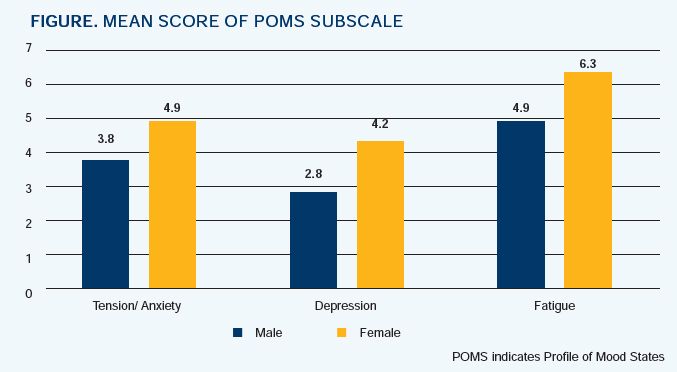Caregivers' Mental Health Varies by Gender
Even with the rise in male caregivers for patients with cancer, little research has been done to ensure there is effective support for both male and female caregivers. Several researchers have reported that men experience fewer negative aspects of caregiving (such as depression) compared with female caregivers.
Caring for a patient with advanced cancer can have a significant impact on the caregiver’s physical and mental health.1-2 We also know from previous research that patient and caregiver mood states are interdependent.3-4 Thus, it is impossible to address adverse psychological outcomes in patients without also examining the caregivers’ needs. The demographics of these caregivers are changing: Men now account for 40% of the caregiver population.5
Even with the rise in male caregivers for patients with cancer, little research has been done to ensure there is effective support for both male and female caregivers. Several researchers have reported that men experience fewer negative aspects of caregiving (such as depression) compared with female caregivers.6-8 However, this does not hold up when researching other psychological domains. A study by Kim and colleagues9 found higher distress in male spousal caregivers compared with their female counterparts when patients had worse psychosocial functioning. Additionally, male caregivers of patients with breast and gynecologic cancers reported difficulty expressing emotions to others, particularly their male friends.10 The purpose of this study was to examine the gender differences in mood states in caregivers of patients with advanced cancer.
Data were collected from a sub-sample of an Institutional Review Board—approved, nonrandomized palliative care clinical trial. The parent study recruited patients with advanced lung, gastrointestinal, or gynecologic cancer and their caregivers. Caregivers were interviewed by a research assistant who administered the Profile of Mood States (POMS)-short form. The POMS, a psychological rating scale used to assess transient, distinct mood states,11 measures 6 dimensions of mood and uses a 5-point Likert scale.
Scores are summed for each subscale. Higher scores for these subscales are representative of greater mood disturbance.
Of the 222 caregivers enrolled in the study, 152 (68.5%) were female and 70 (31.5%) were male. The majority were Caucasian, with the most common relationship to the patient being spouse/partner. We found that the male caregivers were slightly older (mean age, 60 years), more likely to be a spouse of the patient (90%), and more likely to be employed than their female counterparts. Female caregivers had a mean age of 55 years, were a spouse of the patient in 58% of the cases, and were employed in 55% of the cases.
In addition to describing the demographic similarities and differences between male and female caregivers, we examined psychological outcomes of caregiving by gender. In previous similar studies, most of the male caregivers were spouses of female patients with breast or gynecologic cancer.10 In our sample, however, 42.9% of the male caregivers were caregivers of female patients with gynecologic cancer. Our sample of male caregivers comprised caregivers of patients with lung (21.4%) or gastrointestinal (35.7%) cancer.
We found that male caregivers of patients with cancer had lower tension/anxiety scores (P = .04), lower depression scores (P = .009), and less fatigue (P = .04) than female caregivers of patients with cancer (Figure).

Figure
Female caregivers reported higher levels of tension/anxiety, depression, and fatigue. The findings regarding depression differences are similar to those reported in the general caregiver population as well as the general population. However, few studies have looked at other psychological or physical outcomes such as tension, anxiety, and fatigue.
This information is essential for clinical nurses in the oncology setting. It is important to assess all caregivers for distress, anxiety, depression, and fatigue early in the cancer care process. Although male caregivers had lower scores on these dimensions compared with female caregivers, they still reported scores higher than the general population in these domains—particularly in the area of fatigue. Clinical nurses often have the best understanding of how caregivers are faring and are often the member of the healthcare team who spends the most time with both the patient and the caregiver. As cancer care continues to rely on the efforts of caregivers, it is important for oncology nurses to assess both patients and their caregivers for indicators of stress, anxiety, and fatigue.
Our data support the work of others in showing that female caregivers are more likely to be depressed and anxious; however, it is important to note that both genders experience these negative psychological outcomes. Oncology nurses are in the best position to assess, support, and refer caregivers of patients with cancer—both male and female—to sources of support. Whether caregivers receive informal support from family, friends, or support groups or receive more formal support from a primary care provider, oncology nurses are best equipped to see that these caregivers receive the support that they need.
References:
1. Corà A, Partinico M, Munafò M, Palomba D, Health risk factors in caregivers of terminal cancer patients: a pilot study. Cancer Nurs. 2012;35(1):38-47. doi: 10.1097/NCC.0b013e31820d0c23.
2. Frambes D, Given B, Lehto R, Sikorskii A, Wyatt G. Informal Caregivers of cancer patients: review of interventions, care activities, and outcomes. West J Nurs Res. 2017;40(7):1069-1097. doi: 10.1177/0193945917699364.
3. Jacobs J, Shaffer K, Nipp R et al. Distress is Interdependent in Patients and Caregivers with Newly Diagnosed Incurable Cancers. Ann Behav Med. 2017;51(4):519-531. doi: 10.1007/s12160-017-9875-3.
4. Bambauer KZ, Zhang B, Maciejewski PK, et al. Mutuality and specificity of mental disorders in advanced cancer patients and caregivers. Soc Psychiatry Psychiatr Epidemiol. 2006;41(10):819-824.
5. Sharma N, Chakrabarti S, Grover S. Gender differences in caregiving among family - caregivers of people with mental illnesses. World J Psychiatry. 2016;6(1):7-17. doi: 10.5498/wjp.v6.i1.7.
6. Nijboer C, Triemstra M, Tempelaar R, Mulder M, Sanderman R, van den Bos G. Patterns of Caregiver experiences among partners of cancer patients. Gerontologist. 2000;40(6):738-746.
7. 5. Li Q, Mak Y, Loke A. Spouses' experience of caregiving for cancer patients: a literature review. Int Nurs Rev. 2012;60(2):178-187. doi: 10.1111/inr.12000.
8. Pinquart M, Sorensen S. Gender Differences in caregiver stressors, social resources, and health: an updated meta-analysis. J Gerontol B Psychol Sci Soc Sci. 2006;61(1):P33-P45. doi: 10.1093/geronb/61.1.P33.
9. 7. Kim Y, Loscalzo M, Wellisch D, Spillers R. Gender differences in caregiving stress among caregivers of cancer survivors. Psychooncology. 2006;15(12):1086-1092. doi: 10.1002/pon.1049.
10. Lopez V, Copp G, Molassiotis A. Male Caregivers of patients with breast and gynecologic cancer. Cancer Nurs. 2012;35(6):402-410. doi: 10.1097/ncc.0b013e318231daf0.
11. McNair D, Lorr M, Droppleman L. Profile of Mood States. 1971. Educational and Industrial Testing Service.

Innovative Program Reduces Nurse Turnover and Fosters Development
Published: September 12th 2024 | Updated: September 12th 2024The US Oncology Network (The Network) has developed one of the most comprehensive programs in the nation to support the professional development and retention of new oncology nurses.


